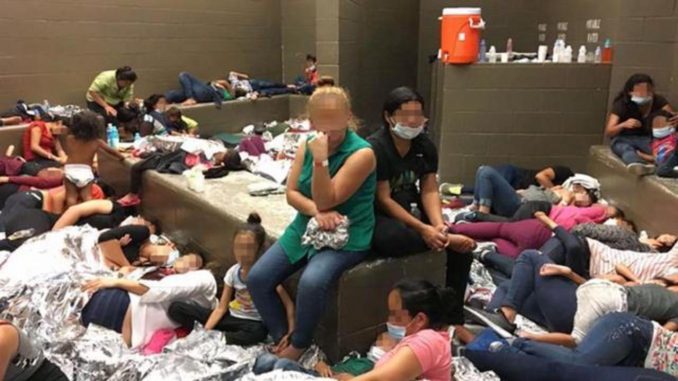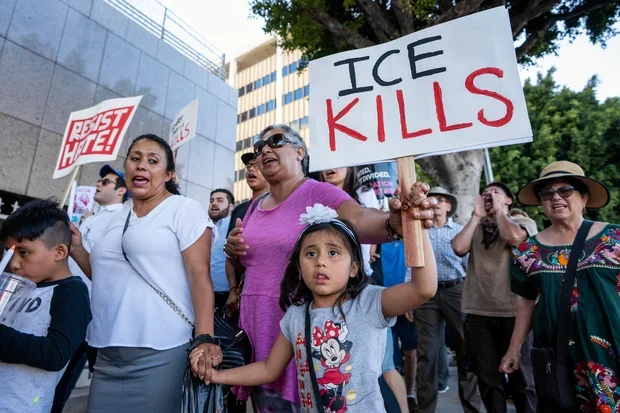
Langley Park, Md. — Affordable housing and accessible public transportation in this suburb on the outskirts of Washington have attracted newcomers from all over the world, particularly Central America and the Caribbean.
On the summer weekends, many residents in this predominantly immigrant community attend Mass, dine out with their families at one of the nearby pupuserias or other immigrant-run eateries and send remittances to their families in their native countries through the local Western Union. Others simply step into the streets outside their red-brick apartments, where some of their neighbors sell shaved ice with chili powder and sliced mangoes with lime and salt from unpretentious food carts.
But in recent weeks, some of them — especially those in the U.S. without a legal status — have been living under constant trepidation and fear even a trip to the local convenience store. Like other immigrants in communities across the country, they’ve been on edge since President Trump vowed to order mass deportations of undocumented families last month.
“Sometimes, the streets are empty now,” said Yennifer, a native of Guatemala and now a resident of Langley Park, which is just to the northeast of Washington.
When the 22-year-old mother, who spoke on the condition that her last name not be used, first learned through Facebook and WhatsApp of Mr. Trump’s announcement, she said she worried for her two children. Seven months ago, she crossed into the U.S. from Mexico illegally while pregnant to reunite with her husband Kevin, 24, who had crossed the southern border a month earlier with their 5-year-old son.
“I’m scared to go outside. I’m scared to go to all places,” she said in Spanish. “My biggest fear is that if they take me, what’s going to happen to my husband? And if they take my kids away from me, what’s going to happen to them?”

Yennifer and her husband, who now works in landscaping, grew up and lived in the western highlands of Guatemala, from which many have also fled in recent months because of suffocating poverty and crop failures due to climate change-induced severe weather. She said they decided to leave after receiving death threats. The young couple, along with their with 5-year-old, are now seeking asylum in the U.S. and have dates in immigrant court scheduled for next year.
But Yennifer said the prospect of being deported, especially if they are denied asylum, is terrifying. She fears she might be separated from her 22-day-old baby girl, a U.S. citizen.
“The government is only thinking about getting rid of people. They don’t think about the families we have,” she said. “There are kids involved.”
Víctor, 51, has been feeling a similar sense of anxiety recently. He also spoke on the condition of not disclosing his last name.
“In this country, if you don’t have papers, there’s always fear. But now it’s worse,” Víctor said as he returned from work. Like many immigrant men in the area, he’s hired by companies and individuals to work on landscaping projects in affluent suburban homes near Langley Park.
The day laborer lives alone in the U.S. but is the main breadwinner for his family in Guatemala, which he left four years ago when the crops he cultivated, mainly coffee, began to fail. He journeyed through Mexico to cross into the U.S. illegally.
Although he’s well-aware of the repercussions of living in the U.S. without a legal status, Víctor said he does not think it is smart or fair for the government to target people who are simply looking to sustain their families.
“If you’re just here working — not committing crimes or anything like that — you should be left alone,” he said, also in Spanish.
Two weeks ago, the president said he would delay the wave of roundups of undocumented families he had telegraphed days before. But he nevertheless threatened to order mass deportations unless Democrats in Congress agreed to revamp the nation’s asylum laws by Saturday.
Multiple efforts to overhaul the nation’s immigration system have failed under both Republican and Democratic administrations, and there is currently no legislation with sufficient bipartisan support to pass in both chambers of Congress, especially during the short timeline Mr. Trump demanded.
(snip)
On Friday, the president said the roundups would be “starting fairly soon.” His top official at U.S. Citizenship and Immigration Services (USCIS) said Immigration and Customs and Enforcement (ICE), which is responsible for removal operations, was ready to find and deport approximately 1 million people with final orders of removal.
“Here we are talking about ICE doing its job as if it’s special, and really this should be going on a rolling basis,” acting USCIS director Ken Cuccinelli told “Face the Nation” on Sunday, adding later, “They’re looking forward to just doing their jobs.”
Deporting “millions,” or even 1 million as Cuccinelli suggested, during Mr. Trump’s tenure is something likely to be logistically impossible given ICE’s resources and manpower.
Last year, ICE removed more than 250,000 people, and many were migrants recently apprehended near the U.S.-Mexico border. The highest number of yearly deportations came during the Obama administration in 2012, when the agency removed approximately 410,000 undocumented immigrants. According to ICE, 55% of those immigrants had been convicted of felonies or misdemeanors.
Any large-scale deportation blitz would also likely elicit a massive public uproar and affect not only undocumented immigrants with pending removal orders, but millions of mixed-status families with members who are U.S. citizens and green card holders.
However, ICE officials have signaled the expected roundups would target a limited group.
Former acting ICE director Mark Morgan, who is now heading Customs and Border Protection (CBP), told reporters last month the undocumented immigrants ICE would focus on for the operation, which he said is designed to send a “powerful message” of deterrence, were on an expedited docket in the immigration court system. He said they were ordered deported by a judge for failing to appear in court and were also notified by ICE so the agency could organize their removal.
Asked whether this specific operation was still “postponed” — a term used by both Mr. Trump and ICE — the agency sent CBS News an old statement in which spokesperson Carol Danko praised the president’s decision to delay the raids. “If Congress does not change the laws to ensure illegal aliens can be promptly removed at the southern border, there is no alternative but to continuously arrest these fugitive aliens in the interior,” Danko said in the statement.
An ICE official said the agency does not divulge “specific details” about law enforcement operations but noted that agents prioritize the removal of those who “pose a threat to national security, public safety and border security.”
Nick Katz and his Langley Park-based immigrant advocacy group CASA have been making sure local immigrants are aware of their rights and are operating a hotline for people to report ICE activity. He stressed, however, that it’s important for them not to amplify the panic he believes the administration is looking to instill in immigrant communities.
“That’s what they want,” said Katz, an attorney who is the senior manager of CASA’s legal services. “They want people to be afraid to go to the grocery story. They want people to self deport. They want immigrants to essentially be afraid to engage in the basic activities of life in this country.”
Still, he said the danger for many immigrant families is real.
“ICE is out there breaking up families every day. And I have no doubt that these raids, there’s definitely a danger they will move forward, and we’ll see a period of time when even more people are picked up. So, there are real consequences for families,” he said.
For Luba Cortés, an immigrant defense coordinator for Make the Road New York, one of the largest immigrant advocacy groups in the New York area, one her most pressing concerns is so-called “collateral arrests.” These are apprehensions of people who are undocumented but who are not directly targeted by an ICE operation. They just happened to be in the place where the operation takes place.
“There is a real, palpable fear,” Cortés said, adding later, “To say, ‘We’re going to have a raid today,’ then, ‘We’re not going to have a raid today,’ really plays with people’s emotions.”
Indeed, despite its likely limited scope, the looming ICE operation has already fueled conspicuous apprehension in immigrant households. Arguably, the “powerful message” Morgan admitted was the one of the objectives of the operations has already been sent — at least to the people already in the U.S.
“We are all worried. We are all scared,” said Abel, 47, a Guatemalan father of three.
Abel, who requested his last name not to be disclosed because he is in the country without a legal status, said he now “works with fear” during his day job, a 6 a.m. to 5 p.m. gig repairing roofs in the Maryland suburbs.
The Guatemalan immigrant lives with his 17-year-old son, who crossed the southern border three months ago and is now seeking asylum. The teenager is now learning English in an American high school and working with his father after school.
Abel said he’s not really afraid for himself, but for his son and two young daughters, who he noted are in Guatemala and have not come to the U.S. because of the dangerous journey through Mexico to reach America. He is certain that in poverty-stricken Guatemala, which he left months ago when the corn farming collective he worked in was ravaged by severe drought, he will not be able to provide for his family.
“Going back is not an option,” he said.
*see full story by CBS News